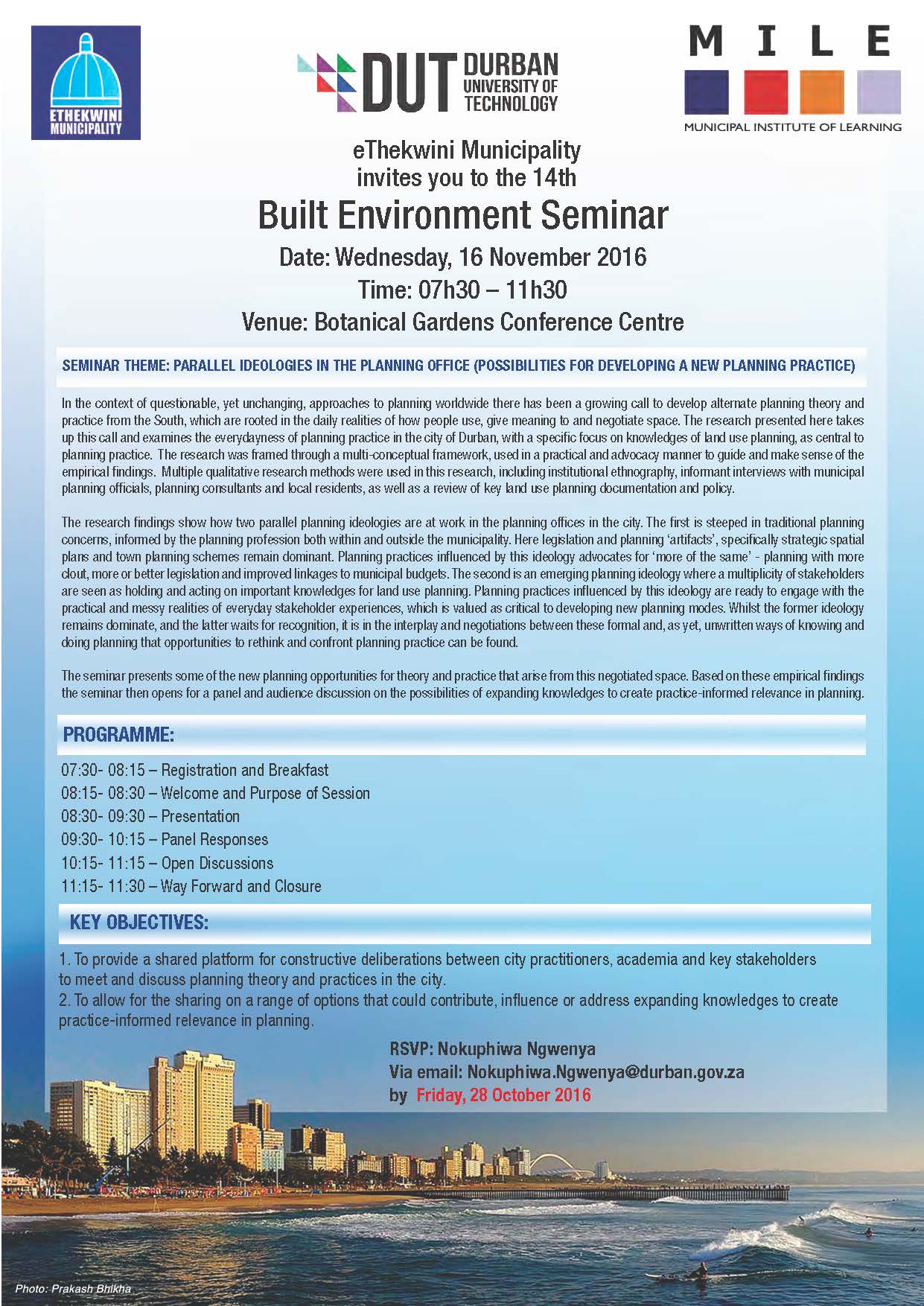Date/Time
Date(s) - Wed - 16 Nov
7:30 am - 11:30 am
Categories
eThekwini Municipality invites you to the 14th Built Environment Seminar
Date: Wednesday, 16 November 2016
Time: 07h30 – 11h30
Venue: Botanical Gardens Conference Centre
RSVP: Nokuphiwa Ngwenya
Via email: Nokuphiwa.Ngwenya@durban.gov.za by Friday, 28 October 2016
SEMINAR THEME: PARALLEL IDEOLOGIES IN THE PLANNING OFFICE (POSSIBILITIES FOR DEVELOPING A NEW PLANNING PRACTICE)
In the context of questionable, yet unchanging, approaches to planning worldwide there has been a growing call to develop alternate planning theory and practice from the South, which are rooted in the daily realities of how people use, give meaning to and negotiate space. The research presented here takes up this call and examines the everydayness of planning practice in the city of Durban, with a specific focus on knowledges of land use planning, as central to planning practice. The research was framed through a multi-conceptual framework, used in a practical and advocacy manner to guide and make sense of the empirical findings. Multiple qualitative research methods were used in this research, including institutional ethnography, informant interviews with municipal planning officials, planning consultants and local residents, as well as a review of key land use planning documentation and policy.
The research findings show how two parallel planning ideologies are at work in the planning offices in the city. The first is steeped in traditional planning concerns, informed by the planning profession both within and outside the municipality. Here legislation and planning ‘artifacts’, specifically strategic spatial plans and town planning schemes remain dominant. Planning practices influenced by this ideology advocates for ‘more of the same’ – planning with more clout, more or better legislation and improved linkages to municipal budgets. The second is an emerging planning ideology where a multiplicity of stakeholders are seen as holding and acting on important knowledges for land use planning. Planning practices influenced by this ideology are ready to engage with the practical and messy realities of everyday stakeholder experiences, which is valued as critical to developing new planning modes. Whilst the former ideology remains dominate, and the latter waits for recognition, it is in the interplay and negotiations between these formal and, as yet, unwritten ways of knowing and doing planning that opportunities to rethink and confront planning practice can be found.
The seminar presents some of the new planning opportunities for theory and practice that arise from this negotiated space. Based on these empirical findings the seminar then opens for a panel and audience discussion on the possibilities of expanding knowledges to create practice-informed relevance in planning.
PROGRAMME:
07:30- 08:15 – Registration and Breakfast
08:15- 08:30 – Welcome and Purpose of Session 08:30- 09:30 – Presentation
09:30- 10:15 – Panel Responses
10:15- 11:15 – Open Discussions
11:15- 11:30 – Way Forward and Closure
KEY OBJECTIVES:
1. To provide a shared platform for constructive deliberations between city practitioners, academia and key stakeholders to meet and discuss planning theory and practices in the city.
2. To allow for the sharing on a range of options that could contribute, influence or address expanding knowledges to create practice-informed relevance in planning.


